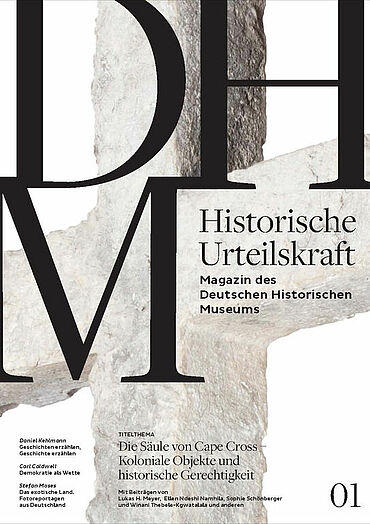THE STONE CROSS FROM CAPE CROSS
COLONIAL OBJECTS AND HISTORICAL JUSTICE

Symposium, June 7, 2018
The Stone Cross of Cape Cross, a controversial object, is found in the Permanent Exhibition of the Deutsches Historisches Museum. It bears the coat of arms of Portugal, crowned by a cross. In Latin and Portuguese it states the claim to sovereignty of the Portuguese King João II over the land marked by the sign. The cross came into German possession in the 19th century when the respective territory became part of the colony “German South West Africa”. Kaiser Wilhelm II had his own sign of sovereignty erected in place of the stone cross. The pillar, which had been set up there by the Portuguese in the 15th century, was then shipped to the German Empire.
In 2017 Namibia laid claim to the coat of arms cross. The Deutsches Historisches Museum now wants to take the discussion of the stone cross as the occasion to explore questions of historical justice. To this end, philosophers, historians, specialists in international law, ethnologists, politicians, and experts from the museum world of Europe and Africa will come together to discuss the topic.
-
![Cover of the 1st “Historische Urteilskraft” magazine.]()
Publication
Historical Judgement 01. Magazine of the Deutsches Historisches Museum
Starting from an outstanding, but also controversial object in the Permanent Exhibition of the Deutsches Historisches Museum – the Stone Cross of Cape Cross – the first issue of the magazine is devoted to the topic of “colonial objects and historical justice” and also contains, among other things, articles on the theory of democracy, on the relation between anti-Semitism and economy, and on the difference between historiography and narrative.
PROGRAMM
as of 16/04/2018
8.30–9.30 Registration
9.30–11.00 Welcome and Adresses
- Raphael Gross
President, Deutsches Historisches Museum, Berlin
- Monika Grütters MdB
Minister of State to the Federal Chancellor
Federal Government Commissioner for Culture and the Media
- H. E. Andreas B. D. Guibeb
Ambassador of the Republic of Namibia to the Federal Republic of Germany
Keynote
- Colonial Objects: imposed, appropriated and exchanged, Francisco Bethencourt, King’s College, London
11.00–11.30 Break
11.30–13.00 Panel I: Postcolonialism and Historical Justice
Moderation: Susan Neiman, Einstein Forum, Potsdam
- Justice over Time. Normative thoughts on the reclamation of objects from the colonial period, Lukas H. Meyer, Karl-Franzens-Universität, Graz
- Justice under Postcolonial Auspices, Achille Mbembe, University of the Witwatersrand, Johannesburg
- The Pillar of Cape Cross and International Law, Sophie Schönberger, Universität Konstanz
13.00–14.30 Lunch break
14.30–16.00 Panel II: Namibian-German (Hi)stories and their Presentation in Museums
Moderation: Larissa Förster, Humboldt-Universität zu Berlin
- Daniel Kariko's Resistance in Cape Cross. German colonial rule and local African history in Namibia, Dag Henrichsen, Basler Afrika Bibliographien, Basel
- Hendrik Witbooi Diaries: From Colonial War Booty to Memory of the World Treasure, Ellen Ndeshi Namhila, UNAM University of Namibia, Windhoek
- Museum Objects, Memory, and Identity in Namibia, Jeremy Silvester, Museums Association of Namibia, Windhoek
16.00–16.30 Break
16.30–18.00 Concluding discussion: Historical Justice in the Museum
Moderation: Julia Voss, Leuphana University of Lüneburg
- Winani Kgwatalala, Botswana National Museum, Gaborone
- Lukas H. Meyer, Karl-Franzens-Universität, Graz
- Sebastian Conrad, Friedrich-Meinecke-Institut, Freie Universität Berlin
- Ruprecht Polenz, Special Emissary of the Federal Republic for coming to terms with the German-Namibian past
Lecture series on Historical Judgement
The Deutsches Historisches Museum sees itself as a place to strengthen historical and political judgement. We need this when we reflect on events of the present in the light of the past, when we remember past occurrences and study them. Historical-political judgement grows through discussion of diverse, often contrasting opinions. For such debates the Deutsches Historisches Museum is a central venue. In these discussions it is not a matter of portraying the past as comprehensively and completely as possible, nor of creating the great narrative of German history, or the reverse of that, the breaking down of the great narratives into endlessly many subjective narratives.
Rather, the aim in the sense of an enlightened impulse is to search for the truth time and again and to bring about an understanding of history in order to then once again question it in the light of new facts and events. It is also not about a value- free or unemotional assessment of history. Historical debates are always borne by emotions – without value judgements we could not differentiate between "important" and "unimportant". But feelings can be inappropriate, evaluations misleading.
To historical judgement belongs the ability to be conscious of its significance and also, by means of reasoning, to query even feelings of moral outrage shared by many people. This also requires in particular the ability to see facts in their individuality and not to dissolve them into opinions. Opinions must put up with the claims of the sources.
The new lecture series "Historical Judgement" is concerned primarily with the principal topics of German history in the context of museum work and the current political situation. The series is directed towards people from Berlin, Germany and the rest of the world who are interested in these topics, and also towards experts from the fields of academia, history and politics.
THE NEW LECTURE SERIES OF THE DEUTSCHES HISTORISCHES MUSEUM "HISTORICAL JUDGEMENT" IS SUPPORTED BY CHRISTIANE AND NICOLAUS WEICKART.
